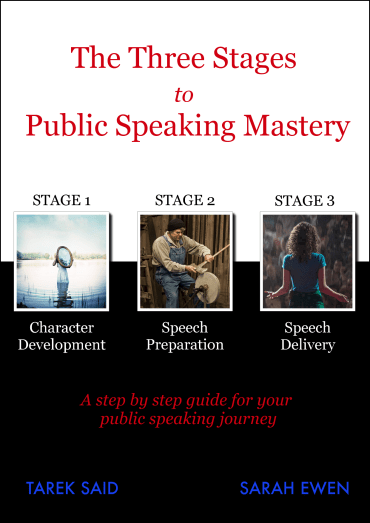HOW TO WRITE A KILLER SPEECH IN 6 SIMPLE STEPS
Writing a speech can be a very daunting task. You feel overwhelmed with ideas, you don’t know where to start, how to end, what to talk about it, how to develop your ideas and the list goes on. The good news is writing a killer speech is really easy when you keep in mind the following six simple steps:
1. Be very clear about the topic of the speech
2. Answer the main question with two to five key points… Ideally three
3. Elaborate on these answers
4. Nail the introduction
5. Have a strong conclusion
6. Pay special attention to transitions
1. BE VERY CLEAR ABOUT THE TOPIC OF THE SPEECH
This is the number one and most important element of any speech. It is the foundation that the entire speech rests upon. If you are not clear about your topic then writing the speech will be extremely difficult and the end result will be a speech which is difficult to understand.
So how do you make sure that the topic is very clear?
The best way to make sure that your topic is very clear is to ensure it answers one of the following questions:
WHAT? WHY? or HOW?
For example, suppose you want to write a speech about “Travel”. Travel is a very broad topic. Writing a speech about it without being very clear about what aspect of travel you want to talk about will be like going down a rabbit hole.
Here are some examples that demonstrate how you can use the method of WHAT, WHY, HOW to get really clear on your speech topic.
WHAT?:
- What are the best countries to visit this year?
- What are the best methods of travel?
- What are the most important things to keep in mind when travelling with kids?
WHY?:
- Why is travelling the best form of education?
- Why is it important to travel to places you have never been to before?
- Why travel on a train, rather than on a plane?
HOW?:
- How travelling can change your life?
- How to travel on a budget?
- How to travel without leaving your home?
It is important to note that the title and the topic of the speech need not be the same. For example, if you choose the topic: “why travel on a train, rather than on a plane”, you could for example have the title: “Trains not Planes”. Or, “Ditch the Plane, Jump on the Train”, etc.
2. ANSWER THE MAIN QUESTION WITH TWO TO FIVE KEY POINTS… IDEALLY THREE
Once you have a very clear question in mind, it is time to find answers to it. Preferably you want to answer the question in using two to five key points. Anything less will come across as too little, and anything more will come across as too much.
Whilst anything between two and five key points is recommended, the ideal number is three. Three is the magic number in public speaking, it is just right. It is not too little and not too much..
For example, let’s say you chose the speech topic: “why travel on a train, rather than on a plane”. You can for example have the following three answers:
- Trains are usually cheaper
- Trains make you appreciate the distances
- In trains you experience a gradual shift of culture
The same principle applies to any other speech topic questions you choose.
3. ELABORATE ON THESE ANSWERS
You now have a main speech question and two to five key answers. Next is to elaborate on these answers. You can elaborate by explaining what you mean by each point, by using examples, stories, statistics and other relevant supporting information.
For example, building on the three answers from the previous point.
1. Trains are usually cheaper
A while ago I had a deep desire to explore the world. There was one problem: I was on a very tight budget! A quick calculation made me realise that airplane tickets will cost me more than half of my travel budget. I started thinking of ways to save money: cheaper hotels, camping, cooking at home. I then realised that I could save a lot of money by travelling by train rather than always going on a plane.
2. Trains make you appreciate distances
A great thing about travel is that it widens your horizons and helps you see the world in a whole new light. One of the biggest things I realised when I travelled in trains was how big the world is! In an airplane we travel halfway across the world in around 10 hours. The same journey will take days if not weeks in a train. This experience alone made me see the world in a totally different light.
3. In trains you experience a gradual shift of culture
When I travelled in trains I witnessed how cultures gradually change across countries, towns and villages. It was an incredible experience that I would not have had had I travelled in planes.
In the examples above, I provided just a few lines of elaboration for each point for demonstration purposes. However, in practice you can elaborate further by adding more stories, examples and explanations.
4. NAIL THE INTRODUCTION
Although the introduction is the first element of the speech, it is not necessarily the first one to be written. In fact it is recommended that you write the introduction after you have decided on the topic and written the body of the speech. The reason for this is the purpose of the introduction is to let the audience know what the speech is about. Before deciding on the topic and writing the speech you usually have a hazy idea of what the entire speech is about and therefore the introduction tends to not be very clear and focused when written first.
A crucial part of the introduction is the first sentence. The first sentence is the most important sentence in the entire speech. It sets the energy, pace and feel of the rest of the speech.
There are four recommended ways to start a killer speech.
- A statement: a statement can be a fact, a statistic, an observation, etc. The more interesting, attention grabbing, or shocking the statement the more engaging and effective it will be.. For example, in the topic of “Trains not Planes” you can use one of the following statements to start the speech.
- Did you know that it is possible to travel from Portugal to Vietnam solely by train?!
- If time was unlimited, I would choose to travel by train instead of plane every single time!
- I love trains!
2. A question: A powerful way to gain insight about the audience can be by starting with a question. There are a couple of things to keep in mind when doing this:
-
- Make sure it is a closed question( Yes or No question). You don’t want to ask a question that has an elaborate answer. For example, an effective question would be: Who here has ever used trains to travel between continents? A example of a ineffective question: what is the longest train route in the world? A closed question ( Yes or No question) is personal, easy to answer, and will engage the audience as everyone can answer it.. An open question is difficult to answer and will engage only a certain members of the audience.
- Indicate to the audience that you want an answer. Either by putting your hand up to let them know that you would like a response or by using a phrase such as: “by show of hands”
- A quote: A powerful way to start a speech is by using a quote. You can find a quote by googling quotes online relevant to your topic. For example, you can start the speech by saying: Anna Funder once said: “I like trains. I like their rhythm, and I like the freedom of being suspended between two places, all anxieties of purpose taken care of: for this moment I know where I am going.”
- A story. This is a very engaging way to start a killer speech. A personal favourite of mine. It is preferable to share a personal a story but you can also tell a story you have heard.
After the first sentence, whether it is a statement, question, quote or story, you can let the audience know what the point of the speech is. For example:
Did you know that it is possible to travel from Portugal to Vietnam solely by train? It is a 17,000 km trip that takes an estimated 275 hours. The same trip takes around 16 hours by plane, yet I will share with you why it is a great idea to do this journey travelling by train..
5. HAVE A STRONG CONCLUSION
The conclusion has a precise role in speeches. In the conclusion you want to remind the audience of what you have covered in the body of the speech and/or have a call to action.
For example, you can conclude the speech as follows:
- If you have the luxury of time, I highly recommend to travel by train. It is cheaper, it makes you appreciate distances and it exposes you to the gradual shift in culture.
In the previous example the conclusion was both a summary and a call to action. You reminded the audience of the three key points you mentioned in the speech which in turn were calls to action themselves.
There are few things to consider when writing the conclusion:
- Make sure you end on a strong note. You don’t want to end your speech they saying something like: Yeah and that’s it, or, I think I have covered everything, or, shall I finish here or do you want me to tell you about an awesome story I once happened to me on the train?
- Make sure you do not add a new point. Adding a new point that was not covered in the body of the speech usually leads to confusion and incoherence of ideas. For example the following conclusion is not ideal: If you have the luxury of time, I highly recommend travelling by trains. I did not mention also how when you take the train you don’t need to be at the station hours before departure. In this example a new point has been introduced that was not mentioned in the speech.
- Make sure you do not sabotage the main topic by contradicting yourself. Here is an example of contradicting oneself: While trains are sometimes better than planes. If you do not have the luxury of time just use the plane instead. In this example a point that was not inline with the purpose of the speech has been added. This sabotages the main purpose of the speech which is encouraging people to use trains
6. PAY SPECIAL ATTENTION TO TRANSITIONS
Transitions are the sentences that connect one element of the speech to another. Transitions are needed to make any speech flow smoothly. Think of them as the lubricants of the speech. Without transitions the speech will be clunky, disjointed and robotic. Always remember to pay special attention to transitions because it is very easy to forget about them, not place enough importance on them or miss them out altogether. In fact, when clients ask me: “Should I memorise my speech?” My answer is: You do not have to memorise the entire speech word for word. However, I always recommend you memorise the introduction, the conclusion, the structure of the body (the 2 to 5 key points) and the transitions between each of these sections.

